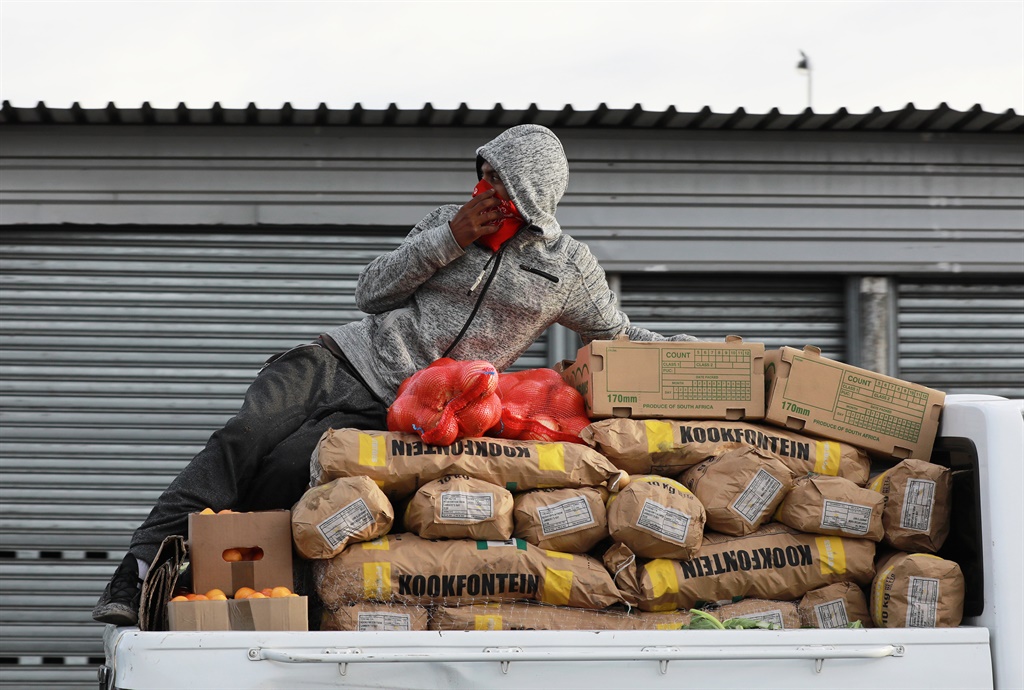


(Photo by Nardus Engelbrecht/Gallo Images via Getty Images)
- Nearly a third of informal workers were “locked out” of employment during April, at the height of lockdown.
- Researchers suggest government increase social protections to informal sector participants substantially.
- Interventions call for the extension of the special Covid-19 grant to the end of 2020.
To better protect informal workers from the impact of Covid-19, government needs to urgently scale-up existing social welfare interventions such as food parcel distributions, expanding the unemployment insurance fund to cover these workers and as well as increasing amounts allocated to social grants, a new study has recommended.
The National Income Dynamics (NIDS) Coronavirus Rapid Mobile Survey (CRAM), which assesses the impact of the Covid-19 pandemic on the employment and welfare of a representative sample of 7 000 South Africans, released its findings on Wednesday.
The study, which involves 30 social science researchers from five South African universities, spans 11 reports with findings on health, employment, and hunger and welfare. The first survey was conducted between 7 May and 27 June. Four more surveys are expected for the remainder of 2020 to continue to assess the impact of Covid-19 on households.
One of the reports, authored by academics Michael Rogan of Rhodes University and Caroline Skinner of the University of Cape Town, specifically looks at the impact of Covid-19 on the informal economy.
Who was hit hardest?
It found that just under a third or 31% of informal workers, were “locked out” of their employment during April, at the height of lockdown restrictions. By comparison, 26% of those in the formal sector reported they were unable to earn incomes. The findings also show that women (33%) were worse affected than men (29%).
Those employed in the informal economy in February and April also reported that their working hours declined. The report notes:
“For the typical informal worker that was employed in both February and April the hours worked per week decreased by as much as 50%.”
Women and those who are self-employed suffered significant declines in working hours.
Similarly, earnings were also reduced, with 37% of the informally self-employed reporting no earnings in April.
- READ | Covid-19 cuts SA employment figures by three million, women worst affected – study
These findings have led to researchers recommending that government increase current interventions to cushion the blows of the pandemic on informal workers, particularly women.
Recommendations include the following:
Increase food parcels: According to the survey, 52% of informal workers reported their household ran out of money to buy food in April. Data also shows that in April and May, food parcels only reached 12% of the population that needed it. One in two South Africans are estimated to experience food insecurity – which warrants the dramatic upscaling of these provisions.
- READ | Food prices shot up, could be slow to come down – and price gouging is just one problem
Expand UIF to informal workers: The report noted that there are “systemic problems” in informal workers accessing the UIF system. The Temporary Employer/Employee Relief Scheme has been changed to allow employees to apply directly for benefits, and the researchers recommend that informal workers be made aware of these changes and that steps be taken to ensure the system is accessible.
Increase amounts allocated to social grants: According to the report, the increase in the monthly social grants between R250 and R500 is still not enough to cover the cost of a basic nutritious diet of a child, nor that of a household. It highlights that the recently introduced increases are still below international averages. “Even a small increase in the relief amounts allocated to these grants, would have significant food security and poverty alleviation impacts,” the report read. Furthermore, grants should be allocated per child, and not per caregiver as currently is the case, this would increase support to poor South Africans by a third more.
Extend coverage of the Special Covid-19 grant: In addition to extending the grant to cover, retrospectively, the more than 1.7 million applicants that were mistakenly rejected, effort must be made to target the grant to women. The researchers also call for the grant to be applied to the end of 2020, and not be limited to the original six-month period.
Revise registration requirements for access small business support: To qualify for this grant from the Department of Small Business Development, applicants must meet a number of requirements such as being registered with the Companies and Intellectual Property Commission, SARS, the UIF and must hold a municipal permit to trade, the report highlights. These requirements have the risk of excluding some informal sector participants.
“These registration requirements need to be relaxed as a matter of urgency,” the report read. The grant should also be better targeted to informal sector activities – such as informal food trade, community and social services and manufacturing. It is currently targeted at small-scale bakeries, clothing and textile businesses and automotive aftermarkets. Foreign nationals and immigrants also excluded from accessing this support, which must urgently be addressed or risk being unconstitutional, the report indicated.

